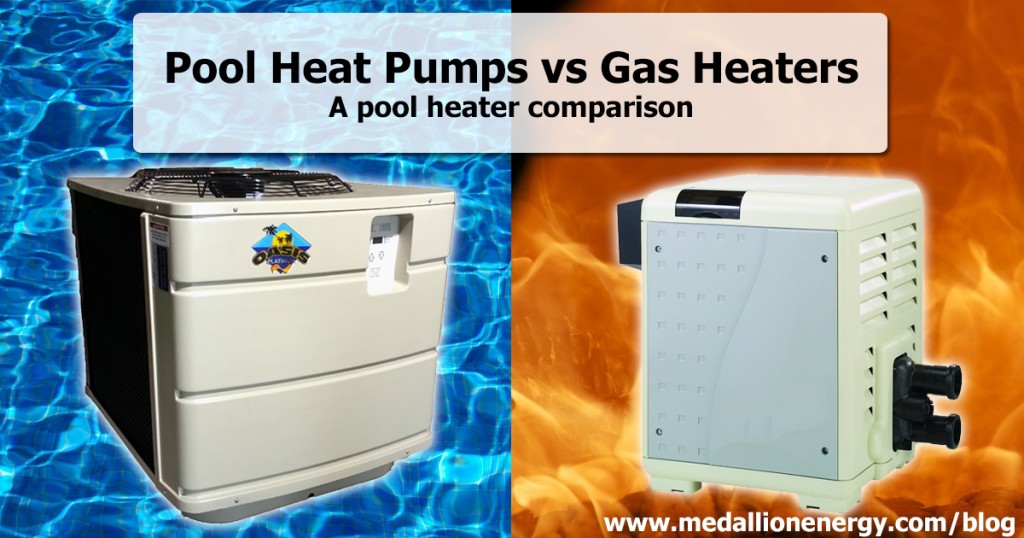Pool heat pumps vs gas heaters — which is best for you? This post answers all the essential questions
Pool heat pumps and gas heaters both keep your pool warm. So what’s the difference?
While a gas pool heater offers quick heating speeds, pool heat pumps focus on energy efficient performance. But that’s just scratching the surface.
Each pool heater has unique features that set it apart from the other, and in this post, we explain the most important things you need to know.
So whether you’re shopping for a new pool heater, or looking to heat your pool for the first time, keep reading. This post breaks down the key differences between pool heat pumps and gas heaters in just a few minutes.
Pool Heat Pumps vs Gas Heaters: How are they different?
Pool heat pumps are all about the long game, while gas heaters are sprinters. In fact, speed is the biggest difference that sets the two apart.
And here’s why: pool heat pumps use the air around them to produce heat, gas heaters rely on burning gas (combustion).
This is why heat pumps provide a slower and more gradual heat that builds up over time. And the other hand, since burning gas immediately generates heat, gas heats can provide more heat in a shorter amount of time.
That said, both heaters still have their limits.
How pool heat pumps produce heat
Using a small amount of electricity, pool heat pumps spin a fan that pulls in warm air over an evaporator coil (the starting point of the high-pressure refrigerant system). When the air flows over the coil, it creates a reaction with the cold refrigerant within.
Eventually, the refrigerant gets warmed up and compressed into a hot gas (natural not gasoline), which then gets sent to a part called the heat exchanger. From there, the pool water flows through, gets heated, and exits into the pool.
Of course, this is a condensed version of the full heating process, but a good summary of how a pool heat pump work overall.
Related: How a Swimming Pool Heat Pump Works
How gas heaters produce heat
Gas heaters receive a steady supply of gas from a gas line connected to either a city supply or a personal propane. When the gas enters the heater, it makes it’s way to the combustion chamber. Here, the gas burns and produces a usable heat for warming up the water that flows through.
Natural heat vs Combustion
Pool Heat Pumps
Since pool heat pumps use natural air to aid the heating process, their pull on electricity is light. From a numbers standpoint, pool heat pumps like the Oasis Platinum offer a Coefficient of Performance of 6.0, meaning that for every unit of energy consumed, approximately six heat units are produced.
Gas Pool Heaters
In exchange for faster heating, gas heaters provide a lower (estimated) average “COP” of around 0.80. This means that gas heaters consume far more energy (fuel) than they produce (heat) per dollar.
Pool Heat Pumps vs Gas Heaters: Installation & Monthly Pool Heating Costs
Note: These estimates are based on the cost of heating an average-sized backyard swimming pool.
Gas Pool Heater monthly operation cost: $300 – $500 per month
Since gas heaters are the most expensive to use, they’re best for heating smaller pools and spas.
GAs Pool Heater installation costs: Installing a gas pool heater ranges anywhere from $2,000 to $5,000 depending on what’s needed (digging, gas lines)
Pool Heat Pump monthly operation cost: $50 – $150 per month
Low heating costs are a product of the natural energy efficiency of pool heat pumps. This makes them ideal for a wide range of pool sizes and climates.
Pool Heat Pump installation costs: Installing a pool heat pump ranges from $2,500 to around $4,500 based on the amount of labor required
Related: What Size Pool Heat Pump Do I Need
Pool Heat Pumps vs Gas Heaters: PROs & CONs
Pool Heat Pumps
PROS:
- Environmentally friendly (0 harmful C02 emissions | Uses R410A refrigerant)
- Highly energy efficient
- Low installation and operation cost
CONS:
- Performance limited by external temperature
- Slower initial heating time (typically 12-48 hours)
- Requires dedicated electrical breaker
Gas Heaters
PROS:
- Fast heating
- Performance unaffected by external temperature or weather
- Quick initial heating time
CONS:
- Requires installation of dedicated gas line
- High operation cost (gas is expensive)
- Better for small pools and spas, or as a backup heater
Which is better for heating a pool, pool heat pumps or gas heaters?
It’s pretty easy to see what sets these two pool heaters apart. While pool heat pumps focus on energy efficiency and cost-effectiveness, gas heaters put speed and performance at the forefront.
Will both pool heaters effectively heat your pool?
Absolutely, you just need to decide which pool heating solution is better for your situation. Consider everything, from your monthly pool heating budget and location to the size of your pool and how often you use it.
If you liked this post you might also like:
- Pool Heat Pumps vs Solar Pool Heaters: Which is best?
- 7 Ways To Extend Your Pool Season By Up To 6 Months
- 9 Ways Owning a Pool Heat Pumps Improves Your Health & Your Life




